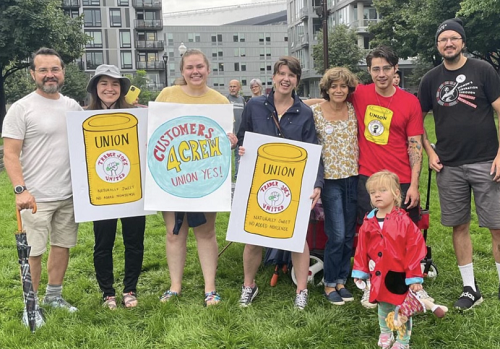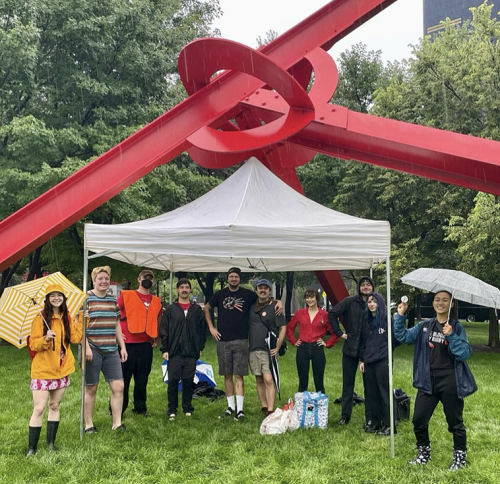Happy Labor Day! Meet Local Labor Leader, Sarah Beth Ryther
 Monday, September 5, 2022 at 2:33AM |
Monday, September 5, 2022 at 2:33AM |  Becky Fillinger |
Becky Fillinger | Article by Becky Fillinger, Photos provided by Sarah Beth Ryther
 Sarah Beth RytherOn Labor Day, our first thoughts are usually on end of summer celebrations. Let’s leave the party for a bit to focus on the real meaning of the holiday: Labor Day is a day to celebrate the achievement of workers. When Labor Day was first celebrated in the late nineteenth century working conditions in the U.S. were often poor and unsafe. Over the decades, organized labor brought about many changes to the workplace in terms of better wages, benefits, reasonable hours and safer working conditions. The work is not finished - labor leaders are still necessary today. Meet Sarah Beth Ryther, employee-organizer, instrumental in the union activity at the Mill District Trader Joe’s. We talked to her about the process of organizing at the store and the amazing energy around unionizing in the country today.
Sarah Beth RytherOn Labor Day, our first thoughts are usually on end of summer celebrations. Let’s leave the party for a bit to focus on the real meaning of the holiday: Labor Day is a day to celebrate the achievement of workers. When Labor Day was first celebrated in the late nineteenth century working conditions in the U.S. were often poor and unsafe. Over the decades, organized labor brought about many changes to the workplace in terms of better wages, benefits, reasonable hours and safer working conditions. The work is not finished - labor leaders are still necessary today. Meet Sarah Beth Ryther, employee-organizer, instrumental in the union activity at the Mill District Trader Joe’s. We talked to her about the process of organizing at the store and the amazing energy around unionizing in the country today.
Q: You mentioned in an interview in early August that there is a “wonderful union energy in our country right now.” Can you tell us more about this notion?
A: This year, there’s been a 58% increase in union representation petitions received by the National Board of Labor Relations, and we’ve all heard about the historic wins at Amazon and Starbucks. A multitude of factors - layoffs during the pandemic, inflation, dissatisfaction with workplace culture - have made workers increasingly willing to search for outside solutions. Ultimately, worker dissatisfaction is not occurring in a vacuum; in the past few years, there’s been a larger national conversation about what work means to us culturally and as a value. The pandemic forced many of us to examine the place work holds in our lives. For discouraged workers, unionization feels like a ready-made solution. While unions were perhaps unfashionable five years ago, most everybody knows somebody who is in a union and has benefited from the larger protections unions can provide.
Q: As a leader, you’ve done your homework – you’ve communicated with other young union leaders, you’ve met with other unions in the area to learn best practices (nurses, educators, craftspeople. etc.) - and formed strong bonds with your co-workers. Could you tell our readers about this groundwork that you did? Could you see yourself taking on a broader national role to share these learnings if the union movement sprouts in other Trader Joe’s locations?
A: For the organizers at our store, it felt intuitive to use trust as a baseline in our union drive. We were committed to having ongoing conversations with each other about what unionization might ultimately mean for every one of us. We wanted our coworkers to know that our relationships with them were far more important than Trader Joe’s or any union, and we repeated this sentiment often. We felt unionizing was the best option to make daily life better for people we care about, but we made sure to let everyone know that if at any point during the drive, we no longer felt it was the right move for us collectively, we would pull out.
We’d encourage other folks looking to unionize their workplaces to do the same: get to know the people around you. The more you know about someone’s life - their passions, values, fears and worries - the better you’ll be able to understand how they can benefit from the worker’s movement.
Personally, I’m very excited to be part of the beginning of such an important national conversation. I’m energized by the possibility of Trader Joe’s United as a presence in many stores with similar concerns across the country, and I’m committed to (slowly and surely) helping make that happen!
 Trader Joe’s United public outreach in the Mill District.
Trader Joe’s United public outreach in the Mill District.
 Trader Joe’s United organizing and community outreach at Gold Medal Park.
Trader Joe’s United organizing and community outreach at Gold Medal Park.
Q: Your Trader Joe's store is located in a densely populated urban area in the Mill District – what safety concerns are on the mind of you and your fellow crew members who voted for the union?
A: We love Downtown East! We’re so proud of our neighborhood, and we feel so lucky to be close to the Guthrie and the Stone Arch Bridge. We also love our neighbors. That being said, emergency situations happen nearly every day, and we’ve asked for more comprehensive training from Trader Joe’s Corporate. Clearer procedures around fire alarms and tornado warnings come to mind. We’d also like access to de-escalation training and equipment that doesn’t take such a toll on our bodies.
Q: Did social media factor into the success of the vote to unionize in your store?
A: By the time we announced in June, we were confident that we would win our election. From June, when we went public, to August, when we voted, we used social media as a tool to communicate with our local and national community. Being part of the larger movement felt particularly important to us. Social media is a wonderful connector - it’s how we learned that the Trader Joe’s in Hadley, MA was organizing. It has also allowed us to have conversations with workers across the country who are in the middle of their own union drives or are interested in organizing.
Q: How may we follow your news?
A: You can follow us on Twitter @TraderJoesUnite, and on Instagram @traderjoesunited. If you’d like to email us, our address is press@traderjoesunited.org.
